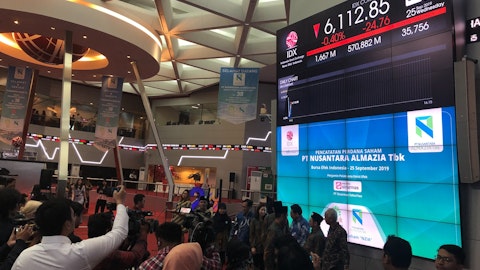Pablo Zuanic: Right. And just a quick follow-up in the use of Australia. So they don’t have production there. Your — the company you acquired, is that something you would look at down the road, especially when you see the case of Israel with dumping claims and the market in Israel shutting down every now and then. Is that a risk in Australia? Would you need to have local production there? And if you can expand on the argument you made about various trend in Australia to other players? Thanks.
Miguel Martin: Sure. I’d be happy to. Just on Israel, we haven’t shipped Israel in a year. But we are not — we’ve had production, as you well know, in other parts of the world. And what we have found, which is really important is that in all of these environments, they allow for the importation registered or certified product. In most cases, that’s EU GMP. In Australia, they’ve been very thoughtful. They have their own registration process and certification process, and we’ve worked with them on that. And so because the economics and the efficiencies of being able to do that in a centralized place like Canada, which is such an incredible place for us to grow, we can leverage the same genetics, the same process at very low energy costs and production costs and ship it around the world, that’s a significant advantage for us.
And we’ve not heard anything in Australia or none of those markets that would restrict the ability of Canadian grown, EU GMP or TGA authorized flower to come into those markets. Now if we found something locally, in any market, we’ve got a long history of managing a variety of different facilities. And so we definitely could do that, but we have not seen that in Australia. Now in terms of your point about restrictions, the TGA, the primary regulatory authority in Australia is incredibly rigorous in what they allow. So first and foremost, the registration process is very rigorous and their requirements are consistent with what we see in Europe, but take anywhere between eight months and 12 months for every new product to be brought in, and they review that.
They do their own testing which they’re reviewing the actual COAs or certificates of assurance for all of these key products, so you have to have vigilance and precision in your production. They review every aspect of the labeling and the packaging, as well as have certification for wholesale delivery and the pharmacies. It’s a high bar, which is why you see concentration, and I don’t think you’re going to see actions in Australia that maybe you’ve seen in other markets. And for that reason, you see good margins. And so, we’re excited about that. We love working with the TGA. And like I said, people can get a little frustrated about the pace sometimes of progress. But when you have great markets like Australia or Germany or others, they don’t go backwards.
And that’s very important from an asset allocation. And I think that’s why we’re so excited about it, and I think why we do so well there.
Pablo Zuanic: Right. Thank you.
Miguel Martin: You’re very welcome, Pablo.
Operator: This concludes our question-and-answer session. I would like to turn the floor back over to Miguel Martin for closing comments.
Miguel Martin: Well, first and foremost, we thank everybody for your interest in Aurora. We are so excited about where we are. And as I said earlier, we’ve never been in better shape. Today, it was a great day to announce the progress that we’ve made in the core business., but as importantly, announced the acquisition of a great asset in one of the fastest-growing and largest medical cannabis markets in the world. We continue to believe medical cannabis is the best place to be in cannabis globally, and we’ve demonstrated our leadership there. So we thank everybody again, and we look forward to speaking with you soon. All the best. Bye.
Operator: This concludes today’s teleconference. You may disconnect your lines at this time. Thank you for your participation.
Follow Aurora Cannabis Inc. (NASDAQ:ACB)
Follow Aurora Cannabis Inc. (NASDAQ:ACB)
Receive real-time insider trading and news alerts





